Joseph Brodsky
| Joseph Brodsky | |
|---|---|
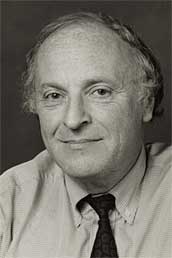 |
|
| Born | Iosif Aleksandrovich Brodsky 24 May 1940 Leningrad, Russia, USSR |
| Died | 28 January 1996 (aged 55) New York City, New York, USA |
| Occupation | Poet, essayist |
| Nationality | Russian - American |
| Ethnicity | Russian Jew |
| Citizenship | United States |
| Notable award(s) | Nobel Prize in Literature (1987) Struga Poetry Evenings Golden Wreath Award (1991) |
| Spouse(s) | Maria Sozzani (1990-1996) |
Iosif Aleksandrovich Brodsky (Russian: Ио́сиф Алекса́ндрович Бро́дский) (24 May 1940 – 28 January 1996) was a Soviet-Russian-American poet, essayist, and Nobel Laureate in Literature. He was appointed Poet Laureate Consultant in Poetry to the Library of Congress in 1991.[1]
Contents |
Biography
Early years
Brodsky was born into a Jewish family in Leningrad. His father was a professional photographer in the Soviet Navy and also published photos in papers and magazines. His mother was a professional interpreter. In early childhood Brodsky survived the Siege of Leningrad when he and his parents nearly died of starvation, and later he suffered from various health problems caused by the siege. When he was fifteen, Brodsky left school and tried to enter the School of Submariners without success. He went on to work as a milling machine operator. Later, having decided to become a physician, he worked at the morgue at the Kresty prison. He subsequently held a variety of jobs at a hospital, in a ship's boiler room, and on geological expeditions.
At the same time, Brodsky engaged in a program of self-education. He learned English and Polish (mainly to translate poems by Czesław Miłosz, who was Brodsky's favorite poet and a friend), and acquired a deep interest in classical philosophy, religion, mythology, and English and American poetry.
Career
Brodsky began writing his own poetry and producing literary translations around 1957. His writings were apolitical. The young Brodsky was encouraged and influenced by the poet Anna Akhmatova who called some of his verses "enchanting."[2]
In 1963, he was arrested and in 1964 charged with parasitism by the Soviet authorities. A famous excerpt from the transcript of his trial made by journalist Frida Vigdorova was smuggled to the West:
- Judge: And what is your profession, in general?
- Brodsky: I am a poet and a literary translator.
- Judge: Who recognizes you as a poet? Who enrolled you in the ranks of poets?
- Brodsky: No one. Who enrolled me in the ranks of humankind?
- Judge: Did you study this?
- Brodsky: This?
- Judge: How to become a poet. You did not even try to finish high school where they prepare, where they teach?
- Brodsky: I didn’t think you could get this from school.
- Judge: How then?
- Brodsky: I think that it ... comes from God, yes God.[3][4]
For his "parasitism" Brodsky was sentenced to five years of internal exile with obligatory engagement in physical work and served 18 months in the Archangelsk region. His sentence was commuted in 1965 after protests by prominent Soviet and foreign cultural figures, including Evgeny Evtushenko, Dmitri Shostakovich, and Jean-Paul Sartre.[2]
In 1964, Leonid Brezhnev came to power. As the Khrushchev Thaw period ended, only four of Brodsky's poems were published in the Soviet Union. He refused to publish his writings under censorship and most of his work has appeared only in the West or in samizdat form.
Exile
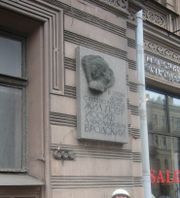
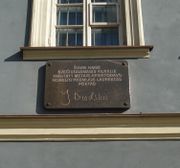
Brodsky was expelled from the USSR on 4 June 1972 and moved to the United States where he was naturalized in 1977. His first teaching position in the US was at the University of Michigan. He was Poet-in-Residence and Visiting Professor at Queens College, Smith College, Columbia University, and the Cambridge University in England. He was a Five-College Professor of Literature at Mount Holyoke College, brought there by poet and historian Peter Viereck.
In 1978, Brodsky was awarded an honorary degree of Doctor of Letters at Yale University, and on 23 May 1979, he was inducted as a member of the American Academy and Institute of Arts and Letters. In 1981, Brodsky received the John D. and Catherine T. MacArthur Foundation's "genius" award. He is also a recipient of The International Center in New York's Award of Excellence.
In 1986, his collection of essays Less Than One won the National Book Critics Award for Criticism. In 1987, he won the Nobel Prize for Literature, the fifth Russian-born writer to do so. At an interview in Stockholm airport, to the question: "You are an American citizen who is receiving the Prize for Russian-language poetry. Who are you, an American or a Russian?", he responded: "I am Jewish - a Russian poet and an English essayist".[5]
Brodsky held an honorary degree from the University of Silesia and was an honorary member of the International Academy of Science.
In 1991, Brodsky became Poet Laureate of the United States. His inauguration address was printed in Poetry Review.
Ideas
A recurring theme in Brodsky's writing is the relationship between the poet and society. In particular, Brodsky emphasized the power of literature to positively impact its audience and to develop the language and culture in which it is situated. He suggested that the Western literary tradition was in part responsible for the world having overcome the catastrophes of the twentieth century, such as Nazism, Communism and the World Wars. During his term as the Poet Laureate, Brodsky promoted the idea of bringing the Anglo-American poetic heritage to a wider American audience by distributing free poetry anthologies to the public through a government-sponsored program. This proposal was met with limited enthusiasm in Washington. Much of Brodsky's writing–particularly his essays such as Less Than One–dabbled in existentialist philosophy.
Personal life
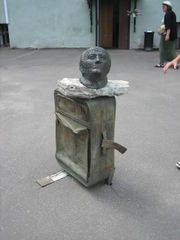
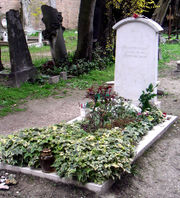
In 1962, in Saint Petersburg, Anna Akhmatova introduced Brodsky to the artist Marina Basmanova. Marina had the type of appearance which fascinated Brodsky: her dark hair, green eyes and mellow voice enchanted the poet. She believed herself to be the most beautiful woman, and Brodsky believed himself to be the best poet[6]. From then until his exile in 1972 Brodsky had a relationship with Marina Basmanova which produced a son Andrey. Basmanova joined Brodsky in his sentence in Archangelsk, but she never married Brodsky, because of obstruction from the Soviet authorities. She registered the child under her own surname[7]. However, Brodsky supported Marina and Andrey.
In the 1990s Brodsky invited his son to visit him in New York for three months, and they maintained father-son relationship until Brodsky's death. Andrey married in the 1990s and the marriage produced three children, all of them were recognized and supported by Brodsky as his grandchildren. Marina, Andrey and his children are living in Saint Petersburg, Russia.
In 1990, while teaching literature in France, Brodsky married a young student Maria Sozzani, who has a Russian-Italian background. The marriage produced one daughter, Anna.
Brodsky died of a heart attack in his New York City apartment on January 28, 1996, and was buried in the Episcopalian section at Isola di San Michele cemetery in Venice, Italy (the setting of his book Watermark).
A close friend to fellow Nobel laureate Derek Walcott, Brodsky was memorialized in Walcott's poetry collection The Prodigal (pp. 26–27).
Bibliography
Works in English
- Poetry
- 1967: Elegy for John Donne and Other Poems, selected, translated, and introduced by Nicholas William Bethell, London: Longman[8]
- 1968: Velka elegie, Paris: Edice Svedectvi
- 1972: Poems, Ann Arbor, Michigan: Ardis
- 1973: Selected Poems, translated from the Russian by George L. Kline. New York: Harper & Row
- 1977: A Part of Speech[9]
- 1977: Poems and Translations, Keele: University of Keele
- 1980: A Part of Speech, New York: Farrar, Straus & Giroux
- 1981: Verses on the Winter Campaign 1980, translation by Alan Myers.–London: Anvil Press
- 1988: To Urania : Selected Poems, 1965-1985, New York: Farrar, Straus & Giroux
- 1995: On Grief and Reason: Essays, New York: Farrar, Straus & Giroux
- 1996: So Forth : Poems, New York: Farrar, Straus & Giroux
- 1999: Discovery, New York: Farrar, Straus & Giroux
- 2000: Collected Poems in English, 1972-1999, edited by Ann Kjellberg, New York: Farrar, Straus & Giroux
- 2001: Nativity Poems, translated by Melissa Green–New York: Farrar, Straus & Giroux
- Essays
- 1986: Less Than One: Selected Essays, New York: Farrar, Straus & Giroux, winner of the National Book Critics Circle Award
- 1992: Watermark, Noonday Press; New York: Farrar, Straus & Giroux
- 1996: On Grief and Reason
- Plays
- 1989: Marbles : a Play in Three Acts, translated by Alan Myers with Joseph Brodsky.–New York: Farrar, Straus & Giroux
- 1991 Democracy! in Granta 30 New Europe, translated by Alan Myers and Joseph Brodsky.
- Interviews
- 2003: Joseph Brodsky: Conversations, edited by Cynthia L. Haven. Jackson, Miss.: University Press of Mississippi Literary Conversations Series.
Works in Russian
- 1965: Stikhotvoreniia i poemy, Washington, D.C. : Inter-Language Literary Associates
- 1970: Ostanovka v pustyne, New York: Izdatel'stvo imeni Chekhova (Rev. ed. Ann Arbor, Mich.: Ardis, 1989)
- 1977: Chast' rechi: Stikhotvoreniia 1972-76, Ann Arbor, Mich.: Ardis
- 1977: Konets prekrasnoi epokhi : stikhotvoreniia 1964-71, Ann Arbor, Mich.: Ardis
- 1977: V Anglii, Ann Arbor, Mich.: Ardis
- 1982: Rimskie elegii, New York: Russica
- 1983: Novye stansy k Avguste : stikhi k M.B., 1962-1982, Ann Arbor, Mich.: Ardis
- 1984: Mramor, Ann Arbor, Mich.: Ardis
- 1984: Uraniia : novaia kniga stikhov, Ann Arbor, Mich.: Ardis
- 1989: Ostanovka v pustyne, revised edition, Ann Arbor, Mich.: Ardis, 1989 (original edition: New York: Izdatel'stvo imeni Chekhova, 1970)
- 1990: Nazidanie : stikhi 1962-1989, Leningrad : Smart
- 1990: Chast' rechi : Izbrannye stikhi 1962-1989, Moscow: Khudozhestvennaia literatura
- 1990: Osennii krik iastreba : Stikhotvoreniia 1962-1989, Leningrad: KTP LO IMA Press
- 1990: Primechaniia paporotnika, Bromma, Sweden : Hylaea
- 1991: Ballada o malen'kom buksire, Leningrad: Detskaia literatura
- 1991: Kholmy : Bol'shie stikhotvoreniia i poemy, Saint Petersburg: LP VTPO "Kinotsentr"
- 1991: Stikhotvoreniia, Tallinn: Eesti Raamat
- 1992: Naberezhnaia neistselimykh: Trinadtsat' essei, Moscow: Slovo
- 1992: Rozhdestvenskie stikhi, Moscow: Nezavisimaia gazeta (revised edition in 1996)
- 1992-1995: Sochineniia, Saint Petersburg: Pushkinskii fond, 1992–1995, four volumes
- 1992: Vspominaia Akhmatovu / Joseph Brodsky, Solomon Volkov, Moscow: Nezavisimaia gazeta
- 1992: Forma vremeni : stikhotvoreniia, esse, p'esy, Minsk: Eridan, two volumes
- 1993: Kappadokiia.–Saint Petersburg
- 1994: Persian Arrow/Persidskaia strela, with etchings by Edik Steinberg.–Verona: * Edizione d'Arte Gibralfaro & ECM
- 1995: Peresechennaia mestnost ': Puteshestviia s kommentariiami, Moscow: Nezavisimaia gazeta
- 1995: V okrestnostiakh Atlantidy : Novye stikhotvoreniia, Saint Petersburg: Pushkinskii fond
- 1996: Peizazh s navodneniem, compiled by Aleksandr Sumerkin.–Dana Point, Cal.: Ardis
- 1996: Rozhdestvenskie stikhi, Moscow: Nezavisimaia gazeta, revised edition of a work originally published in 1992
- 1997: Brodskii o Tsvetaevoi, Moscow: Nezavisimaia gazeta
- 1998: Pis'mo Goratsiiu, Moscow: Nash dom
- 1996 and after: Sochineniia, Saint Petersburg: Pushkinskii fond, eight volumes
- 1999: Gorbunov i Gorchakov, Saint Petersburg: Pushkinskii fond
- 1999: Predstavlenie : novoe literaturnoe obozrenie, Moscow
- 2000: Ostanovka v pustyne, Saint Petersburg: Pushkinskii fond
- 2000: Chast' rechi, Saint Petersburg: Pushkinskii fond
- 2000: Konets prekrasnoi epokhi, Saint Petersburg: Pushkinskii fond
- 2000: Novye stansy k Avguste, Saint Petersburg: Pushkinskii fond
- 2000: Uraniia, Saint Petersburg: Pushkinskii fond
- 2000: Peizazh s navodneniem, Saint Petersburg: Pushkinskii fond
- 2000: Bol'shaia kniga interv'iu, Moscow: Zakharov
- 2001: Novaia Odisseia : Pamiati Iosifa Brodskogo, Moscow: Staroe literaturnoe obozrenie
- 2001: Peremena imperii : Stikhotvoreniia 1960-1996, Moscow: Nezavisimaia gazeta
- 2001: Vtoroi vek posle nashei ery : dramaturgija Iosifa Brodskogo, Saint Petersburg: Zvezda
Essays in Romanian
- 2005: "Cochilia de sidef", translated into Romanian and edited by George-Razvan Stoica and Alexandra Mitrea, Sibiu, University Press.
Footnotes
- ↑ "Poet Laureate Timeline: 1981-1990". Library of Congress. 2009. http://www.loc.gov/poetry/laureate-1991-2000.html. Retrieved 2009-01-01.
- ↑ 2.0 2.1 Timelessness: Water Frees Time from Time Itself. Natalia Zhdanova. 1st August 07. Neva News (St. PETERSBURG FIRST MONTHLY ENGLISH NEWSPAPER). Last visited Jan. 11, 2009. NevaNews.com
- ↑ Судья: А вообще какая ваша специальность? Бродский
- ↑ Cissie Dore Hill (trans.)Remembering Joseph Brodsky. Hoover Institution
- ↑ Works and Days. A Jew or a Hellene? chapter by Simon Markish
- ↑ http://www.nevanews.com/index.php?id_article=666§ion=13
- ↑ http://www.nevanews.com/index.php?id_article=666§ion=13
- ↑ "Joseph Brodsky Bibliography". Nobel Foundation. 1987. http://nobelprize.org/nobel_prizes/literature/laureates/1987/brodsky-bibl.html. Retrieved 2009-01-01.
- ↑ Robert D. McFadden (29 January 1996). "Joseph Brodsky, Exiled Poet Who Won Nobel, Dies at 55". The New York Times. http://query.nytimes.com/gst/fullpage.html?res=9F07E6DE1039F93AA15752C0A960958260&sec=&spon=&pagewanted=print. Retrieved 2009-01-01.
References
- Труды и Дни (Works and Days, 1998) Edited by Pyotr Veil and Lev Losev
- Строфы века. Антология русской поэзии (Verses of the Century, 1995) Edited by Evgeny Evtushenko
- Biografía y poemas en español de Joseph Brodsky
- Bykov Dmitry, The Joseph Brodsky in my mind, Russia Beyond the Headlines, http://rbth.ru/articles/2010/04/02/cartoon_allies.html, retrieved 24 March 2010
External links
- Literary Encyclopedia
- "A Tribute to Joseph Brodsky" (archived 2008)
- Short Biography
- (Russian) Brodsky: biography, photos, poems, critical essays
- (Russian) Some prose and essays by Brodsky
- 21 English poems by Brodsky
- Joseph Brodsky–Biography at Nobelprize.org
- (Russian) Comprehensive site on Brodsky
- (Russian) Interview with Yevgeny Rein giving background on Brodsky's life
- Written in Stone - Burial locations of literary figures.
- Finding aid for the Joseph Brodsky Papers at the Beinecke Rare Book and Manuscript Library, Yale University
|
||||||||
|
|||||
|
|||||
|
|||||||||
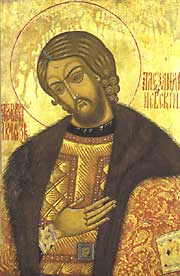
.jpg)